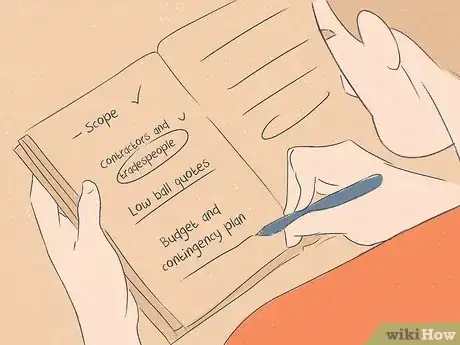This article was co-authored by William Gardner, PsyD. William Gardner, Psy.D. is a Clinical Psychologist in private practice located in San Francisco, CA’s financial district. With over 10 years of clinical experience, Dr. Gardner provides individually tailored psychotherapy for adults using cognitive behavioral techniques, to reduce symptoms and improve overall functioning. Dr. Gardner earned his PsyD from Stanford University in 2009, specializing in evidence-based practices. He then completed a post-doc fellowship at Kaiser Permanente.
This article has been viewed 23,758 times.
If your spouse or partner does nothing but think about house and garden renovations 24 hours a day and talks of nothing else, it can become both boring and frustrating for you when you don't feel the same enthusiasm. It's time to take charge and make it clear to your spouse or partner that your life together is about more than just renovations.
Steps
Communicating your Feelings
-
1Tell your partner how you feel. Communicating your feelings is an important part of a relationship. You need to tell your partner if you are upset about the amount of time or money they spend on renovations. It is important not to sound accusatory, but instead approach the issue from a position of mutual understanding and respect.
- You could say something like, “I respect your enthusiasm for renovations but don’t share the same passion.”
- Alternatively, you may say, "I love the changes that you're making here, but I'd like for us to spend some time on other things at least once a week."
EXPERT TIPWilliam Gardner, Psy.D. is a Clinical Psychologist in private practice located in San Francisco, CA’s financial district. With over 10 years of clinical experience, Dr. Gardner provides individually tailored psychotherapy for adults using cognitive behavioral techniques, to reduce symptoms and improve overall functioning. Dr. Gardner earned his PsyD from Stanford University in 2009, specializing in evidence-based practices. He then completed a post-doc fellowship at Kaiser Permanente.Clinical Psychologist
 William Gardner, PsyD
William Gardner, PsyD
Clinical PsychologistOur Expert Agrees: Communicate with your partner about what is happening and how you feel. Let them know what you would like to happen in the future and don't make any threats. Communication gives you the chance to make the situation right.
-
2Listen to your spouse. Listening is just as important as vocalizing your feelings when communicating. Make sure that you actively listen to your partner and understand why they enjoy renovations. You can show that you are listening by using a technique called reflection. [1] With reflection, you rephrase and repeat what the person who is speaking says to show that you understand it.
- For example, if your partner says that they love the feeling of completing a project and getting the opportunity to be creative, you can reflect by saying, “I am hearing that you enjoy renovations because it allows you to feel a sense of creative accomplishment.”
Advertisement -
3Pay attention to non-verbal communication. Communication is both verbal and non-verbal and we often ignore our non-verbal social cues. Communicate your feelings through words rather than tone and make sure you use inviting and open body language. [2]
- For example, speak at a moderate noise level. Raising your voice while communicating may suggest that you are angry, or feel like your point is not being heard.
- You should also keep your arms relaxed at your sides. Folded arms can give off a signal that you are not comfortable in the conversation.
-
4Ask your partner to name the things he or she loves most about renovating. Try to understand why your partner enjoys doing renovations. This may help you to make peace with the amount of time they devote to this task.
- Denying your partner of all future renovations would be a mistake because this is clearly something they enjoy. Instead, if you understand the pleasure they gain through renovations you may find that you are able to cope with a reasonable amount of renovating.
Working Together
-
1Make a budget. Some people may dislike the expense associated with renovations. If this is the case, sit down with your partner and make a detailed budget together. This will allow you to feel a part of the renovation process and will give you some control over the cost. Once you have agreed on a budget make sure that you and your partner stick to the budget. Here are a few tips to help you stick to your budget:
-
2Get involved with the renovations. Some couples find that taking part in renovations together can actually strengthen their partnership. Ask your partner how they would like to see you more involved in the renovation process.[6]
- Create a list of the things that your spouse or partner likes and tick off three things that you wouldn't mind helping with.
- Check in with your partner throughout the renovation process to see how things are going. If you are knowledgeable about the day-to-day activities you will feel more involved with the entire process.
-
3Find other activities you can do as a couple. Renovating should not be the only joint activity you have as a couple. Find other things that you enjoy doing and set aside some time for them. Think back to the early stages of your relationship before you purchased a home. How did you spend your time? What types of activities did you do together? Here are a few suggestions:
- Go to a museum or art gallery.
- Go out for dinner.
- Take a long walk through your neighbourhood.
- Spend time with your friends.
- Engage in an activity with your kids.
- Watch a movie or TV show together.
-
4Get out of the house. Renovations can often make your home feel incomplete. By removing yourself from the house for a few days you may be able to relax and find other things to discuss as a couple.
- Plan and take a mini vacation together.
- Rent a hotel room locally and have a date night together.
Creating a Balance
-
1Divide your time. Renovations can become all consuming. Make sure you set aside time for other activities. Renovations should not take up all of your free time and they should not be the sole topic of conversation between you and your partner.
- Come up with a word to say when the talk of renovations has become unbearable for you. Rather than telling your partner you can’t take it anymore you can just use a special word that signals you want to change the subject.
-
2Create a schedule together. Buy a calendar and clearly mark down times or days of the week to be spent on renovations and other days where you will not complete any renovations.
- It is important that once you create a schedule you stick to it. Remember that these renovations are important to your spouse. If you have agreed to spend time working on the renovation you need to follow through with this.
-
3Set aside a significant amount of time between renovations. If your spouse has multiple renovation projects on the go or often completes back-to-back renovations you may want to set aside a specific amount of time between renovations. This will help to create a balance between time spent in your home with a renovation underway and time without any renovations in progress.
- For example, ask your spouse for at least six months without renovations once a project is completed.
Warnings
- Don't let renovations drag on for years and define your purpose and life together. Couples who accept this state of affairs often end up finding there is a big hollow space in their relationship when the renovations are finally over. Ask if fixing the living space is worth more than the relationship space.⧼thumbs_response⧽
References
- ↑ http://psychcentral.com/blog/archives/2009/04/14/9-steps-to-better-communication-today/
- ↑ http://psychcentral.com/blog/archives/2009/04/14/9-steps-to-better-communication-today/
- ↑ http://www.nab.com.au/personal/learn/renovating-your-home/6-tips-for-working-out-your-renovation-costs
- ↑ http://www.styleathome.com/how-to/renovations/article/how-to-manage-renovation-costs
- ↑ http://www.nab.com.au/personal/learn/renovating-your-home/6-tips-for-working-out-your-renovation-costs
- ↑ http://www.nytimes.com/2006/07/27/garden/27addicts.html?_r=0





































































